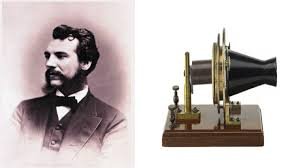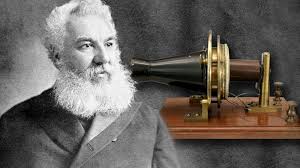The Inventor of the Telephone: Alexander Graham Bell’s Pioneering Achievement
Introduction: The Revolution of Communication
Alexander Graham Bell, a Scottish-born inventor, is renowned for his groundbreaking invention of the telephone. This device revolutionized global communication, transforming the way people interact across distances. Bell’s work on the telephone laid the foundation for modern telecommunication, influencing various aspects of both personal and professional life.
The Breakthrough Moment
In 1876, Alexander Graham Bell made history by patenting the first practical telephone. His invention allowed for the transmission of clear speech over electrical wires, a significant advancement from previous communication methods like the telegraph. Bell’s initial successful transmission of the phrase “Mr. Watson, come here, I want to see you” marked a pivotal moment in technological innovation.
Impact on Society and Technology
The telephone’s introduction was a game-changer for societies around the world. It facilitated instantaneous communication, which was previously unimaginable. This technological advancement had far-reaching impacts, including the growth of business and global commerce, improvements in emergency services, and the overall enhancement of personal communication.
Bell’s Contribution Beyond the Telephone
Alexander Graham Bell’s contributions extended beyond the telephone. He was also involved in other scientific endeavors, including advancements in optical telecommunications and aeronautics. His work paved the way for future innovations and established him as a prominent figure in the scientific community.
The Legacy of Alexander Graham Bell
Today, Alexander Graham Bell’s legacy continues to influence modern telecommunication. The fundamental principles he established in the 19th century still underpin the technology we use for communication. Bell’s invention not only transformed how people connect with one another but also set the stage for future technological advancements.

Why This News is Important
Significance of the Telephone’s Invention
Alexander Graham Bell’s invention of the telephone is a cornerstone of modern communication technology. Before its development, communication across long distances was limited and inefficient, relying on slower methods like telegraphs or postal services. The telephone introduced a new era of instant communication, enabling real-time conversations between individuals separated by vast distances. This technological leap transformed business operations, personal interactions, and even emergency response systems.
Influence on Global Commerce and Connectivity
The telephone played a crucial role in expanding global commerce. Businesses could now communicate with partners and clients around the world instantly, facilitating international trade and collaboration. This connectivity fostered economic growth and innovation, allowing for more dynamic and responsive business environments.
Advancements in Technology and Society
Bell’s invention set the stage for future technological advancements, leading to the development of mobile phones, internet communications, and other forms of telecommunication. The telephone revolutionized society by making communication more accessible and efficient, contributing to the rapid development of modern technology.
Educational Value and Historical Impact
For students preparing for government exams, understanding the impact of Alexander Graham Bell’s invention is essential. It highlights the importance of technological innovation in shaping modern society and provides historical context for the development of communication technologies. This knowledge is valuable for grasping the broader implications of technological progress on various aspects of life.
Inspiration for Future Innovators
Bell’s work serves as an inspiration for aspiring scientists and inventors. His success demonstrates the potential for groundbreaking discoveries to change the world. Students studying his achievements can draw motivation from his persistence and ingenuity, which are crucial qualities for any future innovator.
Historical Context:
Early Communication Methods
Before the invention of the telephone, communication over long distances relied on methods such as semaphore systems, optical telegraphs, and the Morse code used in telegraphs. These methods, while innovative for their time, had limitations in terms of speed and efficiency.
Development of the Telephone
In the mid-19th century, Alexander Graham Bell began working on a device that could transmit sound electrically. His experiments led to the development of the telephone, which he successfully patented in 1876. Bell’s invention was a significant leap forward, allowing for clear, real-time voice communication over wires.
Impact on Technology and Society
The telephone rapidly gained acceptance and became a crucial tool in both personal and professional settings. It spurred further innovations in telecommunications and laid the groundwork for future technologies such as mobile phones and the internet. The telephone’s success demonstrated the potential for technological advancements to transform society and improve daily life.
Bell’s Legacy and Continued Influence
Alexander Graham Bell’s contributions extend beyond the telephone. His work in various scientific fields influenced future technological developments and established him as a key figure in the history of science and technology. His legacy continues to inspire new generations of innovators and researchers.
Key Takeaways from Alexander Graham Bell’s Invention
| Serial Number | Key Takeaway |
|---|---|
| 1 | Alexander Graham Bell invented the telephone in 1876, revolutionizing communication by allowing real-time voice transmission over electrical wires. |
| 2 | The telephone greatly impacted global commerce by facilitating instant communication across long distances, enhancing business operations and international trade. |
| 3 | Bell’s invention set the stage for future technological advancements in telecommunications, including mobile phones and the internet. |
| 4 | Understanding the historical context of the telephone’s development provides insight into the evolution of communication technology and its societal impact. |
| 5 | Alexander Graham Bell’s work serves as an inspiration for future innovators, highlighting the importance of creativity and perseverance in scientific discovery. |
Important FAQs for Students from this News
1. Who is credited with inventing the telephone?
Alexander Graham Bell is credited with inventing the telephone. He patented the device in 1876, which allowed for the transmission of clear speech over electrical wires.
2. What was the first successful phrase transmitted by Bell’s telephone?
The first successful phrase transmitted by Alexander Graham Bell’s telephone was “Mr. Watson, come here, I want to see you.”
3. How did the invention of the telephone impact global communication?
The invention of the telephone revolutionized global communication by allowing instant voice transmission over long distances. This transformation improved personal communication, business operations, and emergency response systems.
4. What were some of Alexander Graham Bell’s other contributions to science?
In addition to the telephone, Alexander Graham Bell made significant contributions to optical telecommunications and aeronautics. His work in these fields furthered scientific understanding and technological development.
5. Why is the invention of the telephone significant for students studying current affairs?
Understanding the invention of the telephone is crucial for students as it highlights the impact of technological advancements on society. It provides historical context for modern communication technologies and demonstrates the influence of innovation on global connectivity and commerce.
Some Important Current Affairs Links

















